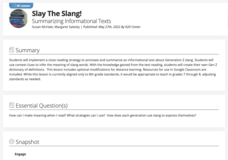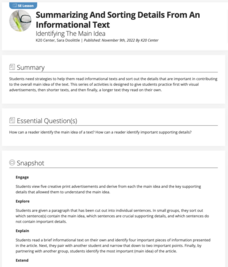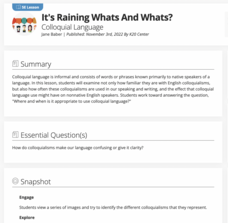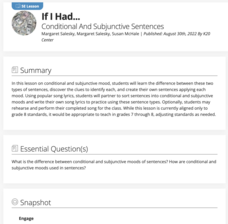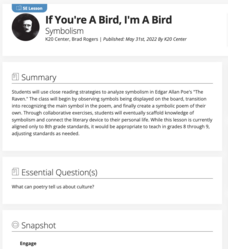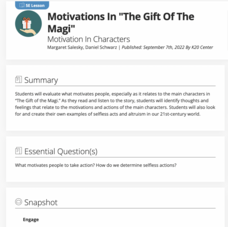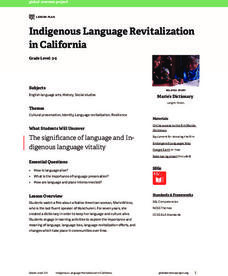K20 LEARN
Rikki-Tikki-Types of Sentences: Indicative, Imperative, Interrogative Mood
Rudyard Kipling's "Rikki-Tikki-Tavi" and a song from the musical "Hamilton" allow middle schoolers to practice using punctuation to indicate whether sentences are indicative, imperative, or interrogative.
Curated OER
Mirror Image
Why does practice make perfect? Give your class insight into procedural memory, where we learn to do new things — then continue to improve through repetition. By attempting to draw shapes while looking in a mirror, learners observe their...
K20 LEARN
Slay the Slang! Summarizing Informational Texts
Middle schoolers get hip to the jive with a lesson about slang. They closely examine examples of slang and use context clues to infer the meaning of the terms. Groups read and summarize an article about a teacher who created a Gen Z...
K20 LEARN
Summarizing and Sorting Details from an Informational Text: Identifying the Main Idea
Scholars participate in two activities that teach them to identify the main idea and key supporting details in informational text. Partners create a visual that reflects the main idea and key supporting details in an informational text...
K20 LEARN
It’s Raining Whats and Whats? Colloquial Language
"Yuns betta outten the lights!" Colloquial language is the focus of a lesson that asks middle schoolers to consider the pros and cons of using idioms. They read articles, match expressions with their meaning and place of origin, and...
K20 LEARN
It’s All Greek to Me: Greek and Latin Roots
Ancient Greeks and Romans have contributed far more to modern culture than mythic heroes and stunning architecture. Greek and Latin roots are the foundation of many English words. Middle schoolers engage in an activity that asks them to...
K20 LEARN
Mob Mentality and "The Outsiders": Integrating Fiction and Nonfiction
S. E. Hinton's The Outsiders allows middle schoolers to reflect on mob mentality. After reading an article and watching a video about herd mentality, class members find examples in the novel of when characters go along with the crowd and...
K20 LEARN
Multimodal Narrative Writing: Thumbprint Autobiography
Thumbprints, like people, are unique. Middle schoolers watch videos that explain how fingerprints are created and why they are unique. Learners then respond to guiding questions about themselves and use these details to create their...
K20 LEARN
If I Had... Conditional and Subjunctive Sentences
Lines from popular songs are used to teach middle schoolers about conditional and subjunctive moods. Groups engage in a card sort activity to identify conditional and subjective sentences and then partners draft sentences of each type....
K20 LEARN
If You Give a Mouse a Cookie: Conditional Statements
If, then, Else is not only a basic programming language command, it is also the basis for conditional statements used in writing. Middle schoolers try to craft conditional statements with a card sort activity and then collaborate on a...
K20 LEARN
Sweet and Savory Writing: Descriptive Writing
The engagement is in the details. Young scholars learn the benefit of weaving descriptive and sensory details into the fabric of their writing through the activities in this lesson. As their hands explore items concealed in bags, a...
K20 LEARN
Is Pizza Epic? Word Choice
Remember when everything was Fantastic! Fabulous! Awesome! Iconic! A series of activities encourages young writers to move beyond these overused descriptors and instead choose a more precise language.
K20 LEARN
Nose Like a Cherry: Understanding Similes and Metaphors
Clement Moore's "Twas the Night Before Christmas" models the power of descriptive language for middle schoolers. They identify the similes and metaphors in the tale and consider what these descriptions add to the story's emotional...
K20 LEARN
No Imitations, Please! Avoiding Plagiarism
With all the stuff available online, good essays are just a click away. But talk about tracking! Writers beware! New tech can now identify plagiarism, and the consequences of presenting someone else's work as your own are severe. Here's...
K20 LEARN
More than Meets the Eye: Direct and Indirect Characterization
Willy Wonka takes center stage in a lesson about direct and indirect characterization. Scholars read a passage from the story about Wonka's Grand Entrance and watch a film clip of the same, noting examples of direct and indirect...
K20 LEARN
Introduction to Expository Writing
Move beyond the five-paragraph essay with a lesson introducing young writers to various forms of expository writing. Class members examine description, cause and effect, problem solution, sequence, and comparison forms. They create an...
K20 LEARN
If You're a Bird, I'm a Bird: Symbolism
Would a bluebird be as scary as a vulture? Edgar Allan Poe's "The Raven" is the central text in a lesson about symbolism. After a close reading of the poem, learners consider what the raven might represent to the narrator. They then...
K20 LEARN
Motivations In "The Gift Of The Magi": Motivation In Characters
O. Henry's short story, "The Give of the Magi," launches a study of what motivates people to act as they do. Class members identify what they believe are the motivations of the characters in O. Henry's tale and then craft a one-page...
Global Oneness Project
Indigenous Language Revitalization in California
A film showcases a Native American woman and her hard work to create a dictionary detailing her tribe's language. While viewing, scholars reflect upon and discuss the importance of language and sustaining cultural identity.
Global Oneness Project
The Importance of Indigenous Language Revitalization
Middle schoolers consider languages as representations of cultures and the importance of preserving various languages, especially the rapidly disappearing languages of indigenous peoples, in a lesson that tells the story of Marie Wilcox...
Curated OER
Impact of Native Americans
Scholars discover the contributions Native Americans have given the world. Pupils examine materials and discuss their importance, including American Sign Language. A worksheet carefully organizes examples; groups jigsaw a reading passage...
Curated OER
Te Ata Fisher: The Award-Winning Chickasaw Storyteller
Storytelling is a time-honored way to keep a culture alive. Introduce middle schoolers to Te Ata Fisher, the famous Chickasaw storyteller who shared her stories, songs, and dances across the United States and Europe. Young historians...
Curated OER
What Exactly Is Food Sovereignty?
Something is happening here, and what it is is becoming increasingly clear. Middle schoolers investigate the connections between processed foods and health issues and the movement back, especially by Native Americans, to other food choices.
Curated OER
Celebrate Joy Harjo: The First Native American Poet Laureate
Introduce middle schoolers to Poet Laureate Joy Harjo with a lesson that not only explains the role and duties of the Poet Laureate but also contains a video in which Harjo explains what she sees as her responsibility as a Native...




